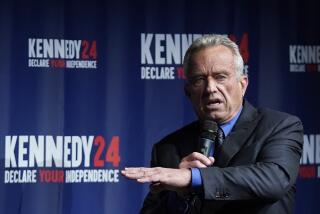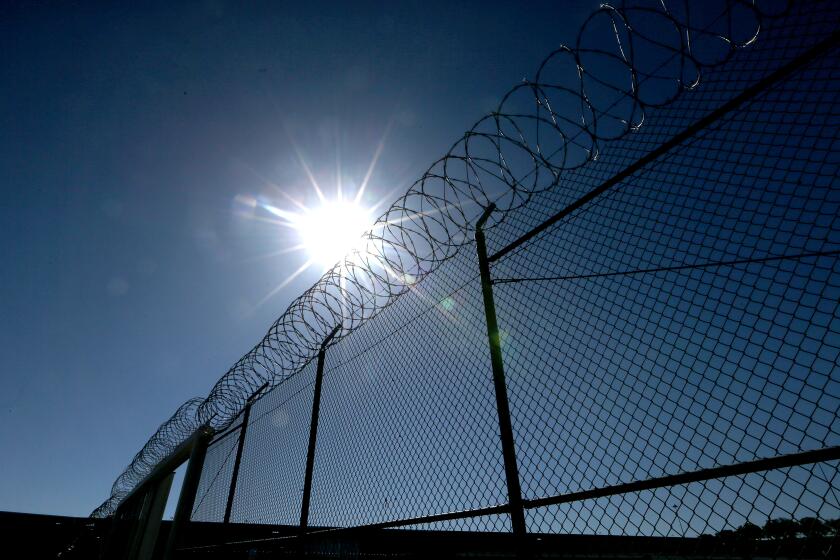Reagan Praises Pakistan’s ‘Bold and Decisive’ Attack
President Reagan praised Pakistan for a “bold and decisive” attack on a hijacked Pan Am jumbo jet Friday, and other Administration officials said that the terrorists were entirely to blame for the deaths and injuries aboard the Boeing 747.
With only sketchy information available about the drama at the Karachi airport, White House and State Department spokesmen said there was no evidence to link the hijackers with Libya or any other country. The Administration has said repeatedly that it would retaliate for terrorist attacks on Americans if it could be certain that another government was responsible.
Officials said that the speedy--although bloody--end to the crisis should be considered further evidence that hijackers and hostage-takers will not be permitted to gain their objectives and will be attacked and overcome, even if innocent lives are put at risk.
“The government of Pakistan acted boldly and decisively to bring this nightmare to an end, and we applaud Pakistan’s exemplary resolve in the handling of this incident,” Reagan said in a written statement issued by White House spokesman Larry Speakes in Santa Barbara while the President remained at his nearby ranch.
Reagan also praised Pan American World Airways’ “cool and professional competence in helping to ensure that this incident could be concluded where it started.”
In Washington, State Department spokesman Charles Redman refused to modify U.S. support for the Pakistani decision to take military action, despite casualties among the passengers.
“I don’t think we want to lose sight in this incident or in others that the responsibility for this (loss of innocent lives) rests solely at the feet of the terrorists who perpetrated the incident,” Redman said. “Let there be no doubt about that. . . . The hijackers started it.”
Reagan said the hijacking “was a cruel and sinister terrorist act.”
“The terrorists conducted a despicable and cowardly crime by threatening, assaulting and murdering innocent passengers of a crowded airliner--men and women, young and old--with machine guns and hand grenades,” the President said. “Nothing can justify such barbarism. We can think of no punishment too severe for the criminals responsible. We are confident that those who perpetrated this brutal act will be brought to justice.”
“Our hearts are filled with sympathy for the families of those innocents killed and injured,” Reagan added.
‘Justice Is Done’
Redman said that reports from Pakistan indicated that two hijackers were killed and that three were taken prisoner. However, later reports from the scene said that there were only four terrorists, and that two of them had been killed. Redman said the United States is confident that the “government of Pakistan will make sure that justice is done” in the case of those who were taken alive.
Redman and Speakes said the decision to storm the plane was made by Pakistani authorities, although they left no doubt that the United States concurred with it. Sixty-five Americans were among the 380 people on the passenger list of the airliner, though it is unclear whether all were aboard when the crisis began.
Secretary of State George P. Shultz hurried back to Washington to take personal charge of the U.S. response to the hijacking. Shultz, who ended a California vacation to address the 350th anniversary celebration at Harvard University, had planned to spend the weekend at his Massachusetts farm.
In his speech, Shultz said that “American resolve, backed by our power” would ultimately free the world from the threat of terrorism.
Task Force in Action
A State Department task force, assembled with veteran counterterrorism experts in what is becoming a distressingly familiar process, kept a line open to the U.S. Embassy in Pakistan, which, in turn, maintained continuous communication with the Pakistani government. Redman declined to say whether a U.S. official was at the Karachi airport during the drama.
The U.S. aircraft carrier Forrestal cut short a port call in Naples and headed into the Mediterranean to move into position off Cyprus, the hijackers’ intended destination.
A Pentagon official described it as a “prudent precaution” to move U.S. military power into position in case it might be needed. As it turned out, the crisis had played itself out before the ship and its battle group could be called into action.
Robert H. Kupperman, a senior staff member of Georgetown University’s Center for Strategic and International Studies and an expert on terrorism, described the outcome as “enormous carnage.”
Blames Pakistanis
Kupperman, usually a hard-liner on terrorism, said that four or five hijackers could not have hoped to hold almost 400 passengers indefinitely. He suggested that Pakistani authorities could have devised a strategy to minimize casualties among the passengers.
The crisis was hauntingly similar to the hijacking of an EgyptAir jetliner last November. In that incident, Egyptian troops stormed the plane at the Malta airport, killing about 60 passengers. At that time, the White House, State Department and Defense Department all praised Egypt for its prompt action.
“The United States fully supports the difficult decisions of the governments of Malta and Egypt,” the State Department said at that time. A Pentagon spokesman added that the action sent a message to terrorists that, “no matter how fanatic and willing they are to sacrifice the lives (of passengers), they won’t be allowed to succeed and gain whatever objectives they have.”
Before Pakistani forces stormed the Pan Am jet, the State Department reiterated the basic U.S. policy: “We are always willing to talk with anyone, or with any group, concerning the safety of American citizens and other innocent victims of terrorist incidents. We will not, however, give in to terrorist demands, nor will we urge third parties to do so.”
Norman Kempster reported from Washington and James Gerstenzang from Santa Barbara.
More to Read
Get the L.A. Times Politics newsletter
Deeply reported insights into legislation, politics and policy from Sacramento, Washington and beyond. In your inbox three times per week.
You may occasionally receive promotional content from the Los Angeles Times.






